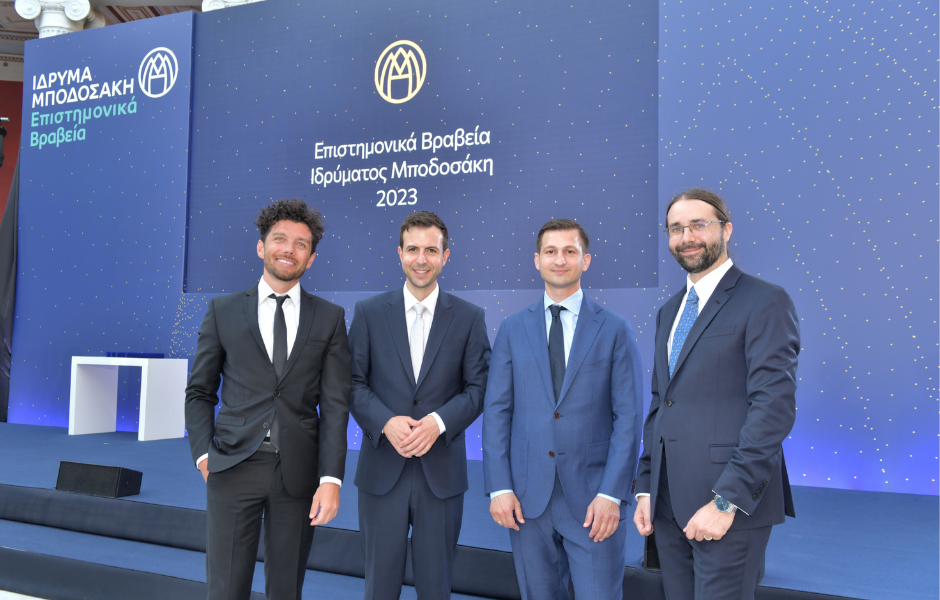Four young Greek scientists who have won international acclaim were recognised for their outstanding performance
Four fascinating scientific worlds, four –Greek-born or of Greek decent– globally influential scientists:
Vassileios Syrgkanis has developed models to predict the effectiveness of new medicines for cancer.
Philipp Strack is deciphering our decision-making processes.
Konstantinos Vogiatzis is using quantum chemistry and artificial intelligence to describe chemical processes that promote clean technologies for the protection of the environment.
Edward Chouchani has revealed how lactic acid is involved (also) in cancer.
The above are only some of the achievements of the four Greek scientists who received the Bodossaki Distinguished Young Scientist Awards 2023, at the presentation ceremony held on Wednesday June 28, in the packed Peristyle of the Zappeion.
Introduced for the first time in 1992, the Bodossaki Distinguished Young Scientist Awards acknowledge and promote the work of young Greek –by nationality or descent– scientists who are leading world-class pioneering research and whose outstanding performance has already significantly contributed to the advancement of science. Awarded every two years, the Bodossaki Distinguished Young Scientist Awards have so far acknowledged 61 outstanding young Greek scientists active around the world.
This year’s laureates have distinguished themselves for their outstanding contribution to the development of knowledge in key scientific fields and for promoting the Greek creative spirit in the international scientific community. In recognition of their scientific excellence, they were presented with the following awards:
In the field of Life Sciences: Biomedical Science
- Edward Chouchani, Associate Professor of Cancer Biology, Dana-Farber Cancer Institute and Associate Professor of Cell Biology at Harvard Medical School
In the field of Science: Chemistry
- Konstantinos Vogiatzis, Associate Professor of Theoretical and Computational Chemistry at the University of Tennessee, Knoxville
In the field of Social Sciences: Economics, Political Science, Law:
- Philipp Strack, Professor of Economics at Yale University
In the field of Applied Science/Technology, Applications of Artificial Intelligence Methods and Technologies in Engineering Disciplines
- Vasileios Syrgkanis, Assistant Professor of Management Science and Technology at Stanford University, Department of Management Science and Technology, Department of Computer Science (by courtesy), James and Anna Marie Spilker Faculty Fellow
In his speech, Edward Chouchani discussed the importance of studying the processes of metabolism: “In our lab we are developing technologies that will help us understand how metabolism and metabolic processes in our cells and tissues can control physiological adaptation and disease. We use these technologies as a starting point to develop new therapies for diseases associated with aging. We hope that, by understanding how metabolism can regulate our cells and tissues, we will discover new ways to modify biology and protect against aging-related diseases.”
Konstantinos Vogiatzis referred to the contribution of theoretical chemistry to the development of new technologies for the separation and storage of carbon dioxide –the main cause of climate change–, which will contribute to counterbalancing the effect of historical pollutant emissions. His research focuses on an alternative technology that significantly reduces the energy cost of the separation process, using passive polymer membranes and optimising their properties. In addition, in order to examine huge molecular datasets, K. Vogiatzis and his team have also developed new hybrid machine learning models.
Philipp Strack discussed a field of his research that is of particular interest for the well-being of societies and concerns the consequences of overconfidence: “We study how overconfidence distorts beliefs and can lead to bad actions with consequences not only on the level of the individual level but also on a broader level, towards society, causing prejudice and racism. Together with my colleagues, we develop a theory on who is prejudiced against whom in society. An interesting finding of this theory explains that there is widespread disagreement about who is discriminated against in society. There are a lot of things that might reduce prejudice and we hope that our work will help understand which measures can have this effect on society.”
Vassileios Syrgkanis spoke about his work in the field of machine learning: “An example of my contribution to the field is the development of machine learning algorithms to discover rules governing the change of a causal relationship based on other characteristics. For example, in the health sector, we want to know for which subgroups a new treatment will have the greatest impact on life expectancy as a function of gene-related and other patient characteristics. The machine learning techniques we developed have the potential to discover complex patterns in the changing of the effect of a specific variable on another one. These models can lead to optimal personalised decision-making.”
The awards were presented to this year’s laureates by two distinguished past laureates:
- Nektarios Tavernarakis, Bodossaki Distinguished Young Scientist Award 2005, currently Chairman of the Board of Directors of the Foundation for Research and Technology – Hellas (FORTH), Chairman of the Governing Board of the European Institute of Innovation and Technology, and Professor of Molecular Systems Biology at the Medical School of the University of Crete.
- Eliza Konofagou, Bodossaki Distinguished Young Scientist Award 2017, currently Professor of Biomedical Engineering and Radiology at Columbia University and Director of the Ultrasound and Elastic Imaging Laboratory of Columbia University.
“Over the years, Bodossaki Foundation has remained committed to supporting education, meritocracy and scientific excellence. We support meritocracy because it alone gives strength and value to any distinction and strengthens democracy. And we support scientific excellence, because it is society as a whole that benefits from it, as the achievements of excellence pave the way for a future world that will be better for all,” said Ms. Athina Dessypri, President of Bodossaki Foundation’s Board of Trustees.
The Award Ceremony, which opened and closed with music by Joseph Haydn performed live by a string trio, was attended by representatives of the state and personalities from the academic, scientific, cultural and business communities, as well as of the Civil Society.
Bodossaki Distinguished Young Scientist Awards
The Distinguished Young Scientist Awards are part of Bodossaki Foundation’s public benefit goals of promoting education and showcasing scientific excellence. The criteria used for selecting the laureates of the Bodossaki Distinguished Young Scientist Awards are the candidates’ outstanding performance in their field of scientific expertise and the comprehensive nature of their research.









